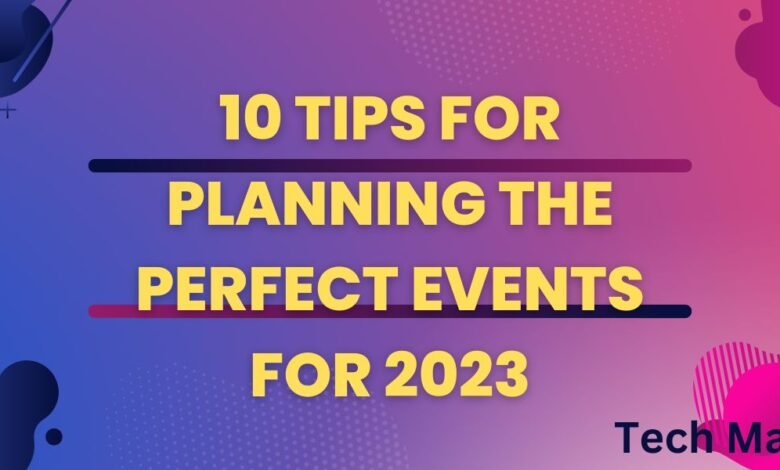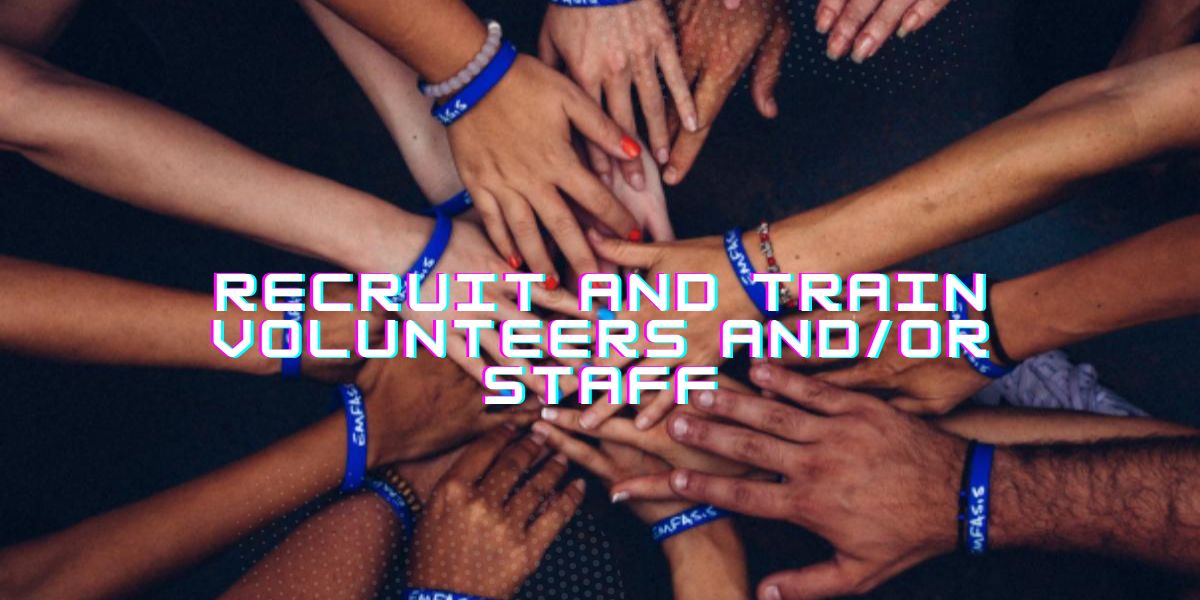10 Tips for Planning the Perfect Events For 2023

Do you know 10 Tips for Planning the Perfect Events For 2023? Organizing an event can be an exciting but overwhelming task, especially when there’s a lot at stake. Whether it’s a corporate conference, a wedding, or a charity fundraiser, the success of an event depends on how well it’s planned and executed. It’s no wonder that event planning is often considered a high-stress job.
But with the right tools and strategies in place, you can make the process less stressful and more enjoyable. In this post, we have put together the ultimate event planning checklist to help you organize the perfect event in 2023. From setting clear goals and timelines to choosing the right venue and suppliers, we’ll cover everything you need to know to make your event a success. So, let’s get started!
Read More: The 5 most important eSports events of 2021
1. Start early: Setting the date, budget, and timeline
When planning an event, it is important to start early to give yourself enough time to prepare and avoid last-minute stress. The first step is to set a date and determine your budget. The date should be chosen carefully, taking into account the availability of the guests, the availability of the venue, and other important factors.
Once you have set the date, you should create a timeline for the event. This timeline should include all the tasks that need to be completed leading up to the event, such as booking the venue, hiring vendors, and promoting the event. It is important to be realistic about your timeline, and to allow enough time for each task.
When it comes to budgeting, it is important to be realistic and to allocate funds for each aspect of the event. This includes the venue, catering, decorations, entertainment, and any other expenses that may arise. It is also important to have a contingency fund in case of unexpected expenses or emergencies.
Starting early and being organized from the beginning will set you up for success and ensure that the event runs smoothly. It will also allow you to make any necessary adjustments along the way, rather than scrambling to make last-minute changes.
2. Define the purpose and goals of the event

Defining the purpose and goals of your event is crucial to its success. Without a clear understanding of why the event is being held and what you hope to achieve, it’s impossible to plan and execute it effectively.
When defining the purpose of your event, ask yourself questions such as: What is the event for? Who is it aimed at? What message do you want to convey? What do you want attendees to take away from the event?
Once you’ve defined the purpose of your event, it’s important to set clear and measurable goals. What do you want to achieve from the event? Are you looking to generate leads, raise brand awareness, or build relationships with customers? Whatever your goals are, be sure to make them specific, measurable, achievable, relevant, and time-bound (SMART).
By having a clear understanding of the purpose and goals of your event, you’ll be able to create an event that is tailored to your target audience and achieves the desired outcomes. This will help ensure that your event is a resounding success and leaves a lasting impression on attendees.
3. Choose the right venue: Consider location, capacity, and amenities
Choosing the right venue is crucial to the success of your event. You want to ensure that your attendees have a great experience, and the right venue can make all the difference. Start by considering the location. Is it easily accessible to your attendees? Is there ample parking or public transportation nearby? You want to make it as easy as possible for your attendees to get to the event location.
Next, consider the capacity of the venue. You don’t want to choose a space that is too small and cramped for your attendees, nor do you want to choose a venue that is too large and feels empty. Be sure to consider the number of attendees you’re expecting and choose a venue that can comfortably accommodate them.
Finally, think about the amenities that the venue offers. Does it have the necessary audiovisual equipment and technology for your event? Is there adequate lighting and sound? Does the venue have a kitchen or catering facilities? These are all important considerations that can impact the success of your event.
Remember, choosing the right venue is one of the most important decisions you’ll make when planning an event. Take the time to research and visit different locations to find the perfect venue for your event. A great venue can help set the tone for a successful event, while a poor venue choice can impact attendance and the overall experience for your attendees.
4. Create a comprehensive event budget

Creating a comprehensive event budget is a crucial step in organizing the perfect event. Without a budget, you might end up spending more than you had anticipated or worse, run out of funds before the event is even over. Start by determining the overall budget for the event and then break it down into categories such as venue rental, catering, decor, and entertainment. Don’t forget to include any miscellaneous expenses such as insurance, permits, and transportation.
When creating your budget, it’s important to be realistic and account for unexpected expenses. Leave some wiggle room in your budget for emergencies or unforeseen costs that may arise. It’s also a good idea to prioritize your expenses so that you can allocate funds to the most important aspects of the event. For instance, if entertainment is a top priority, you may need to allocate a larger portion of your budget to that category.
As you plan your event, keep track of your expenses and regularly update your budget. This will help you stay on track and ensure that you’re not overspending in any one area. And remember, it’s always better to be under budget than over budget! By creating a comprehensive event budget, you’ll be able to plan a successful event that meets all of your goals and stays within your financial means.
5. Select and book vendors: Caterers, audio/visual, decorations, etc.
Selecting and booking vendors is a crucial step in organizing the perfect event. Whether it’s a corporate conference, wedding or birthday party, you need to ensure that you have the right vendors on board to make your event a success. Depending on the nature of your event, you may need to hire vendors such as caterers, audio/visual technicians, decorators, rental companies, and photographers.
Begin the selection process by doing thorough research on the vendors in your area. Look at their websites, and social media pages, and read reviews from past clients. Once you have a shortlist of potential vendors, reach out to them and request quotes for their services. Be sure to ask about their availability on your event date and if they have any packages or promotions that may be applicable to your event.
When selecting vendors, it’s important to consider their experience, quality of work, and reputation. Don’t hesitate to ask for references and examples of their previous work. Once you’ve made your final decision, be sure to book the vendors as soon as possible to avoid any last-minute disappointments. It’s also important to have a clear contract in place outlining the vendor’s scope of work and payment terms.
By taking the time to carefully select and book vendors, you’ll guarantee that your event is well-executed and memorable for all attendees.
6. Create a detailed event schedule
Creating a detailed event schedule is crucial to the success of any event. It helps you keep track of all the moving parts and ensure that everything runs smoothly on the day of the event. The schedule should include all the key milestones leading up to the event, including deadlines for booking vendors, sending out invitations, and finalizing event details.
On the day of the event, the schedule should include a detailed timeline of what’s happening when. This should account for things like setup and teardown times, keynote speeches, breaks, and any other activities or sessions that are taking place. It’s important to make sure that the schedule is realistic and allows for some flexibility in case of any unexpected delays or issues.
When creating the schedule, it’s also important to consider any logistical challenges that may arise. For example, if your event is taking place in multiple locations or if attendees will be traveling to different venues throughout the day, you’ll need to account for transportation and travel time in the schedule.
Overall, a well-designed event schedule can help you keep track of all the details and ensure that everything runs smoothly on the day of the event. By taking the time to create a detailed schedule, you’ll be able to anticipate potential issues and address them before they become major problems.
7. Design an effective marketing and promotional plan
Designing an effective marketing and promotional plan is crucial in ensuring that your event is a success. You want to make sure that your event is well-promoted to your target audience in order to maximize attendance and engagement. The first step in designing your marketing plan is to identify your target audience and understand what would appeal to them the most.
You should consider a multi-channel approach to marketing your event, including email marketing, social media marketing, and paid advertising. It’s important to create a consistent message across all your marketing channels to maintain brand consistency, and to ensure that your messages are targeted to the right audience.
You should also consider offering incentives to people who attend the event, or to those who spread the word about it on social media. This could include discounts on products or services, free goodies, or exclusive access to certain areas or activities within the event.
Another great way to promote your event is by engaging with your audience before the event itself. You can create buzz and excitement by sharing sneak peeks of what’s to come, behind-the-scenes content, and teasers of special guests or activities that will be present at the event.
Finally, don’t forget about post-event promotion. This is a great opportunity to remind attendees of the great time they had, and to encourage them to share their experience with others. You can share photos, videos, and testimonials from attendees on social media, and even create a post-event survey to gather feedback and improve future events.
8. Develop a contingency plan for emergencies or unexpected issues
When it comes to event planning, it’s important to always have a contingency plan in place for emergencies or unexpected issues. No matter how carefully you plan, unexpected issues can arise, and if you’re not prepared, they can quickly spiral out of control and ruin your entire event.
Start by identifying potential risks and challenges that could arise during the event. This could include anything from bad weather to technical difficulties to vendor no-shows. Once you’ve identified these potential issues, develop a plan for how you will handle each one.
For example, if bad weather is a possibility, have a backup indoor location in case you need to move the event indoors. If a vendor doesn’t show up, have a backup vendor ready to step in at a moment’s notice. If technical difficulties arise, have a tech team on standby to quickly troubleshoot and fix any issues.
It’s also a good idea to have an emergency kit on hand that includes items like first-aid supplies, flashlights, and backup batteries. Make sure all staff members are trained on emergency procedures and have a clear understanding of their roles and responsibilities in the event of an emergency.
Having a solid contingency plan in place can help you stay calm and focused in the face of unexpected issues, and ensure that your event goes off without a hitch.
9. Recruit and train volunteers and/or staff

Recruiting and training volunteers and/or staff is crucial to ensuring the smooth running of your event. They will be the backbone of your team and help to ensure that everything runs smoothly on the day.
The first step is to identify what roles you need to fill and then create accurate and detailed job descriptions for each. Once you have a clear idea of what you need, you can start recruiting volunteers or staff members.
When recruiting, take the time to carefully consider each candidate’s experience, skills, and personality to ensure they are the right fit for the role. You can advertise your positions on social media, job boards, and through word of mouth.
Once you have your team in place, it’s time to start training them. This will involve ensuring that they understand their roles and responsibilities, are familiar with the event schedule, and know how to communicate with attendees and other team members. Conducting regular training sessions leading up to the event will help to ensure that everyone is on the same page and that any issues are dealt with before they become a problem.
Finally, remember to thank your volunteers and staff for their hard work and dedication. A little appreciation goes a long way, and it will help to ensure that they are willing to work with you again in the future. By recruiting and training a strong team, you can ensure that your event runs smoothly and is a great success.
Read More: Gains Of Direct Marketing Solutions And Event Marketing
10. Evaluate the success of the event and gather feedback from attendees and stakeholders.
After all the hard work and effort put into organizing an event, it’s important to evaluate its success. This will help you understand what worked well and what needs improvement for future events.
One of the best ways to evaluate the success of an event is by gathering feedback from attendees and stakeholders. This can be done through surveys, questionnaires, or even one-on-one meetings. By doing so, you’ll be able to understand what attendees liked and disliked, what they found helpful or unhelpful, and what they would like to see in future events.
It’s important to take this feedback constructively and use it to improve your future events. You can use the feedback to make changes to your event planning process or even to the event itself. For example, if attendees didn’t like the food, you can consider changing the menu or the catering company for the next event. If attendees felt that the event was too crowded, you can consider moving to a larger venue for future events.
In addition to gathering feedback from attendees, it’s also important to gather feedback from stakeholders such as sponsors, vendors, and partners. This feedback can help you understand how the event impacted their business and whether they would like to work with you again in the future.
Overall, evaluating the success of an event and gathering feedback from attendees and stakeholders is crucial in improving your event planning process and organizing successful events in the future.
Conclusion
We hope you enjoyed our article on event planning and found our checklist helpful! No matter what kind of event you’re planning, following these tips will help you stay organized and ensure that everything runs smoothly. Remember that planning an event takes time, effort, and commitment, but with the right tools and mindset, you can create a successful event that meets and exceeds your expectations. So, make sure to follow our ultimate event planning checklist for your next event in 2023 and make it an unforgettable experience for all attendees!












2 Comments